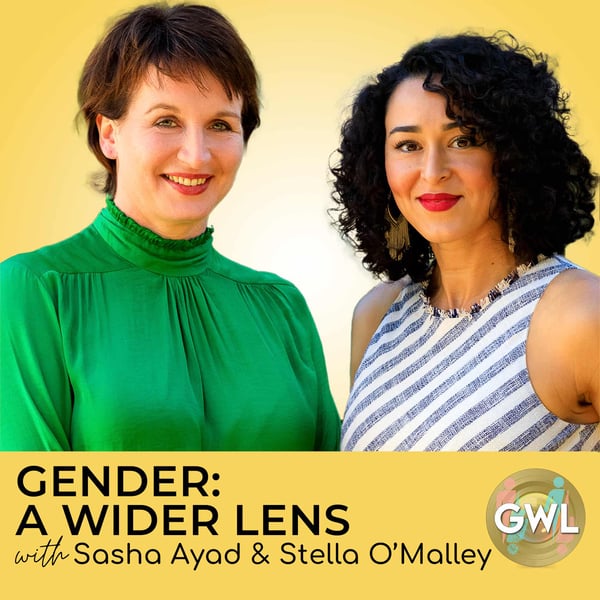Premium: How Gender Ideology Has Infiltrated Art and Culture | with N3VLYNNN
Gender: A Wider Lens
Sasha Ayad and Stella O'Malley
4.6 • 961 Ratings
🗓️ 13 July 2024
⏱️ 4 minutes
🧾️ Download transcript
Summary
The promotion of practices like breast binding as empowering or liberating is problematic, as it glosses over the underlying issues of body image and the societal pressure that drive individuals to modify their bodies. These practices, intended to manipulate the physical form to achieve a desired aesthetic (or an “authentic-self”), often lead to both physical and psychological harm. Although marketed as self-love and self-care within queer circles, the desire for body modification frequently reflects feelings rooted in self-hatred or societal expectations (“norms”) dictating how bodies “should” appear and/or align with a particular “gendered-expression”, rather than genuine self-acceptance.
In this bonus episode for premium subscribers, N3VLYNN critiques the representation of gender ideology in high profile artists and cultural influences, highlighting its contradictions to advocacy for self-love and self-care. The conversation emphasizes how across all cultures, there needs to be space for masculine-presenting women to exist comfortably as themselves, without the pressure or implication that their presentation means they are anything other than the woman that they are.
Referenced in this conversation:
Janelle Monae's "Nonbinary Freedom" & Self-Love Journey
Watch our full length episode with N3VLYNN: https://www.widerlenspod.com/p/episode-173
For instructions on setting up a private feed to listen to our premium content in your favorite podcast app, visit https://support.substack.com/hc/en-us/articles/4519588148244-How-do-I-listen-to-episodes-on-my-podcast-app
Transcript
Click on a timestamp to play from that location
| 0:00.0 | Welcome to Gender A Wider Lens exclusive content. If you're a free listener, what you're about to hear is a preview of a bonus episode for our paid sub-stack subscribers. |
| 0:11.0 | If you'd like to hear the rest, go to widerlands pod.com and sign up for any of our paid membership |
| 0:16.8 | options. |
| 0:17.8 | And to all of our premium and founding member subscribers, thank you for the support. And here's the bonus conversation. |
| 0:26.0 | Okay, so we're back here with Nevin who's a writer and artist |
| 0:30.0 | and we spoke in our full episode about her work on just kind of a black female lesbian experiences and how gender ideology intersects with all of that. |
| 0:41.0 | And you mentioned in the full episode that at the time when some of the Black Lives Matter stuff was really erupting in 2020, you were back and forth between Germany and Nigeria. And Stella knows, I always like to think about the way cultural factors and where we happen to live geographically impacts our identity. |
| 1:01.0 | So I'm really interested, in in Nigeria it seems like that's where you have |
| 1:06.3 | your family is from is that accurate to say? I'm half Nigerian okay so my father's side of the family is Nigerian. |
| 1:14.7 | Okay. |
| 1:15.7 | And do, does your identity and your work like centered around like black female lesbian experiences how how is it perceived and or kind of |
| 1:27.9 | seen in Nigeria and the culture there? |
| 1:46.5 | Well I mean, you know, homophobia is very rife throughout much of Africa, but yeah, you know, Nigeria is where I have the most experience and that's you know that's definitely from the religious aspect that's definitely from the colonial religion that were brought in. My father is from the east, so he is from the |
| 1:58.4 | Christian side of Nigeria. And so yeah, I definitely thought a lot of that I mean it's kind of like |
| 2:06.2 | homophobia is like in the hodgepodge of all the the conservatism that comes with Christian religious behavior. |
| 2:17.0 | So yeah. |
| 2:19.0 | Okay, is, are there generational differences, would you say? I know I know in Egypt I mean I don't live in Egypt of course but it seems like some of the younger generation who are coming up are starting to shift in a more liberal direction, |
| 2:32.6 | but of course there's a religious element there too, |
| 2:34.9 | but does it seem to be generationally changing |
| 2:38.0 | in Nigeria as all places change generationally? |
| 2:41.4 | What do you think? I think that the younger |
| 2:48.8 | generations who have more access to the, who have, you know, more access to the internet and |
... |
Please login to see the full transcript.
Disclaimer: The podcast and artwork embedded on this page are from Sasha Ayad and Stella O'Malley, and are the property of its owner and not affiliated with or endorsed by Tapesearch.
Generated transcripts are the property of Sasha Ayad and Stella O'Malley and are distributed freely under the Fair Use doctrine. Transcripts generated by Tapesearch are not guaranteed to be accurate.
Copyright © Tapesearch 2025.

